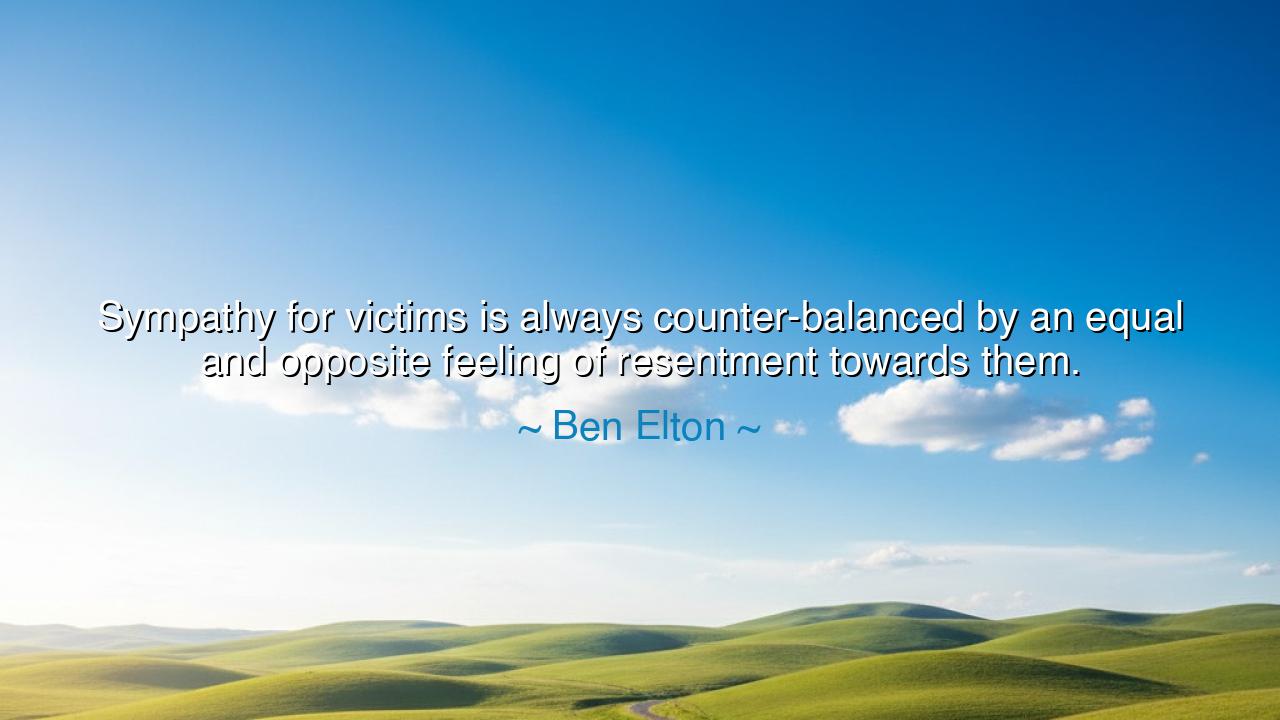
Sympathy for victims is always counter-balanced by an equal and
Sympathy for victims is always counter-balanced by an equal and opposite feeling of resentment towards them.






Listen closely, children of the future, for the wisdom of the ancients is often reflected in the paradoxes of human nature. Ben Elton, a man known for his sharp insights into society, once said: "Sympathy for victims is always counter-balanced by an equal and opposite feeling of resentment towards them." In these words lies a deep truth about the human condition, one that transcends time and culture. It speaks of the complexity of emotions, the way in which the heart, though moved by compassion, is also capable of harboring feelings that are less noble, less gentle, and far more troubling.
In the ancient world, the balance between sympathy and resentment was often explored through myth and legend. The Greeks, in their tragedies, understood this duality well. Consider the tale of Orestes, who, driven by the need for vengeance, kills his mother Clytemnestra to avenge his father, Agamemnon. The gods, in their wisdom, have Orestes pursued by the Furies, ancient beings who symbolize resentment and retribution. While Orestes seeks justice, his actions stir a deep inner conflict—his quest for revenge is rooted in the victimization of his family, yet it also perpetuates a cycle of violence that makes him a victim in his own right. In this tragic paradox, we see that even when one acts in the name of justice, their sympathy for a victim may become tainted by feelings of resentment for what that victim has done, for the suffering that is caused, and the actions that follow.
This ancient theme finds a modern echo in Elton’s words. We often see victims of society’s injustices, whether through poverty, discrimination, or violence, and feel moved by compassion for their suffering. And yet, in the shadows of that compassion, there lurks a more uncomfortable emotion—resentment. It may come in the form of envy, when a victim is seen as gaining attention or sympathy at the expense of others. Or it may stem from a frustration at the seeming helplessness of the victim, the perception that they could take action but do not, or that their suffering is somehow exaggerated. The ancients understood this well: the human heart is a battlefield where noble feelings often clash with darker impulses, and where one’s response to suffering can reveal both the best and the worst of their nature.
Consider, children, the story of Paris and Helen of Troy. The ancient Trojan War, sparked by Helen’s abduction, is a tale of victimhood, revenge, and resentment. Helen, though a victim of abduction, became the object of great resentment—not only from the Greeks but also from the Trojans, who felt betrayed by her actions. Paris, her lover, too was a victim in some ways—caught in the whirlwind of passion and war. Sympathy for Helen quickly transformed into resentment, as the Greeks did not view her as merely a victim but as an agent of destruction. She became, in their eyes, both a victim of her own desires and a culprit in the tragedy that befell Troy. This story, ancient though it may be, mirrors Elton’s insight: the complexity of victimhood lies in how it evokes both compassion and resentment, a dual force that shapes the course of events.
But let us not be consumed by the darker side of this duality. The lesson, children, is not that resentment is inevitable or justified, but that understanding the nature of our emotions is crucial to navigating the challenges of life. Sympathy for a victim must not become a breeding ground for resentment. Instead, it should inspire us to act with greater empathy, to address the causes of suffering without perpetuating the very emotions that cause further harm. Resentment, when left unchecked, becomes a destructive force, just as it did for Orestes, whose revenge ultimately brought him no peace. The cycle of resentment and sympathy can spiral into violence and division, unless we choose to break it with wisdom and understanding.
In your own lives, children, remember that sympathy is not a passive emotion. It requires action, a choice to move beyond the initial feeling and into the realm of healing. Do not let resentment, no matter how natural it may seem, cloud your ability to help. When you see suffering, do not turn your heart against the one who suffers, even if their pain stirs discomfort within you. The true measure of compassion lies in the ability to act without judgment, to offer help without resentment or bias. The road to healing lies in understanding the root causes of suffering, not in perpetuating the divisions between victim and villain.
So, children, take this wisdom into your lives. When faced with the suffering of others, understand the complexity of your emotions, and choose wisely how to respond. Do not be swayed by the forces of resentment that may try to take root within you. Let sympathy guide you toward action and understanding, and not bitterness or division. By embracing compassion and wisdom, you will find the path that not only heals the wounds of others but also releases you from the cycle of resentment that holds us all captive.






AAdministratorAdministrator
Welcome, honored guests. Please leave a comment, we will respond soon